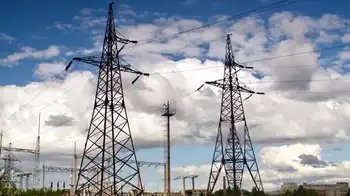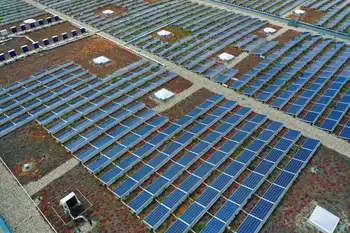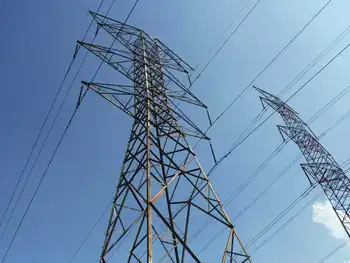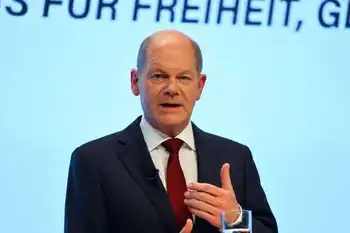Energy firms battle over climate bill
By New York Times
CSA Z462 Arc Flash Training - Electrical Safety Essentials
Our customized live online or in‑person group training can be delivered to your staff at your location.

- Live Online
- 6 hours Instructor-led
- Group Training Available
Producers of natural gas are battling their erstwhile allies, the oil companies. Electrical utilities are fighting among themselves over the use of coal versus wind power or other renewable energy. Coal companies are battling natural gas firms over which should be used to produce electricity. And the renewable power industry is elbowing for advantage against all of them.
Some supporters of global warming legislation believe that the division in the once-monolithic oil and gas industry, as well as other splits among energy producers, could improve the prospects for the legislation.
“It’s much harder to pass clean-energy legislation when big oil and other energy interests are united in their opposition,” said Daniel J. Weiss, climate policy director at the liberal Center for American Progress. “The companies that recognize the economic benefits in the bill can help bring along their political supporters.”
The American Petroleum Institute trade group, dominated by major oil companies, opposes the legislation, saying it would discourage domestic exploration and lead to higher oil prices. But some natural gas companies, though longtime members of the institute, have formed a separate lobby and are working actively with the billÂ’s sponsors to cut a better deal for their product.
The proposal moving through Congress would cap the emissions of greenhouse gases each year and allow companies to buy and sell permits to pollute. That approach, known as cap and trade, is meant to guarantee that emissions will decline, while providing market incentives for companies to invest in low-carbon technologies.
The measure would effectively put a price on carbon, raising the prospect that some energy producers might have to pay more than others. For that reason, billions of dollars could be at stake in some of the most arcane language in the bill.
Energy lobbies are using every tactic in the book to protect their industries, producing alarming studies about $5 gasoline and other steep cost increases that might result from a cap-and-trade system. They are also financing protest groups and advertising campaigns. In one case, a public relations firm working for the coal industry even sent opposition letters to Congress under forged names.
The divisions in the energy sector mirror a split in the broader business community. Several large companies like Apple and the utility Exelon left the United States Chamber of Commerce recently over the groupÂ’s opposition to climate change legislation.
But the biggest fights are among energy producers. They have spent more than $200 million in the first half of the year on lobbying efforts in Washington, according to the Center for Responsive Politics, a nonpartisan research group, up from $174 million in the same period last year.
“The fact that the lobbying is so fast and so furious is a positive sign that this thing is moving along,” said Mark Brownstein, a managing director at the Environmental Defense Fund and an advocate of climate legislation. “The fact that everyone is rushing to Washington tells you people believe it is real.”
As legislation inches through Capitol Hill, onetime allies in the utility sector, like Exelon, which operates low-emission nuclear plants, and the Southern Company, a big consumer of coal, find themselves on opposite sides of the debate over renewable energy.
Utilities that have access to hydroelectric power or operate nuclear plants tend to favor a national mandate to increase the use of renewable power, because their carbon emissions are relatively low. Many coal-dependent utilities, particularly in the Southeast and Midwest, oppose the provision because they emit more carbon and would have to buy more permits over time.
In past energy policy debates, the oil and gas lobbies were largely united. In 2005, they won incentives for drilling in the Gulf of Mexico. Two years later, after Democrats had taken control of Congress, producers were unable to block a huge new mandate for alternative fuels like ethanol and biodiesel, but managed to save valuable oil industry tax breaks that some Democrats tried to end.
Today, each energy subsector, fearing any legislation that might give it a disadvantage, is battling for favor. The gas producers, for example, have formed the American Natural Gas Alliance, which is spending heavily on advertising and lobbying to point out that gas emits roughly half the carbon dioxide of coal. The group has also helped organize its allies in Congress into a new natural gas caucus, with two-dozen members.
“These fissures are happening because a policy is increasingly seen as inevitable,” said David G. Victor, an energy expert at the University of California, San Diego. “Old coalitions are splintering and fascinating new alliances are being formed.”
The most important fight is over whether companies have to buy pollution permits, called allowances, or whether the government hands them out free in the early years to help ease the cost of the transition.
President Obama has said the permits should be auctioned, an approach that would cost companies tens of billions of dollars. But after fierce lobbying from electrical utilities, the House made the permits free in the first decade of the program, to help finance the transition to cleaner fuels and to shield electrical consumers from higher prices.
Industry analysts say the utilitiesÂ’ willingness to negotiate with Democratic lawmakers gained them a huge advantage when the House passed its climate bill in June. The oil and natural gas industries, by contrast, felt shunned in the House debate because they would not negotiate, these analysts say.
For example, oil companies complained that their mandated purchase of emissions permits would amount to a tax to be used to clean up dirty coal plants.
“There was an inherent flaw when Congress set off down the road of favoring one fuel source over another,” said J. Larry Nichols, chairman of Devon Energy, an independent oil and gas company, and also chairman of the American Petroleum Institute. “You knew there had to be a feeding frenzy among various competing fuels trying to protect themselves.”
Half of the nationÂ’s electrical power is generated by burning coal, and emission limits are a long-term threat to the business. The coal industry, through a group it finances called the American Coalition for Clean Coal Electricity, is running a campaign to persuade the public that coal is affordable, abundant and can be cleaned up thanks to still-distant technology that would capture carbon emissions and store them underground.
Some coal executives aim to scuttle legislation in the Senate by continuing to cast doubts on the science of climate change.
“A lot of coal-using utilities seem to be on the wrong side of this issue,” said Don L. Blankenship, the chief executive of Massey Energy, the largest producer of Appalachian coal, who has called climate legislation a hoax and a Ponzi scheme. “How can they be so confident that man is changing the world climate?”











